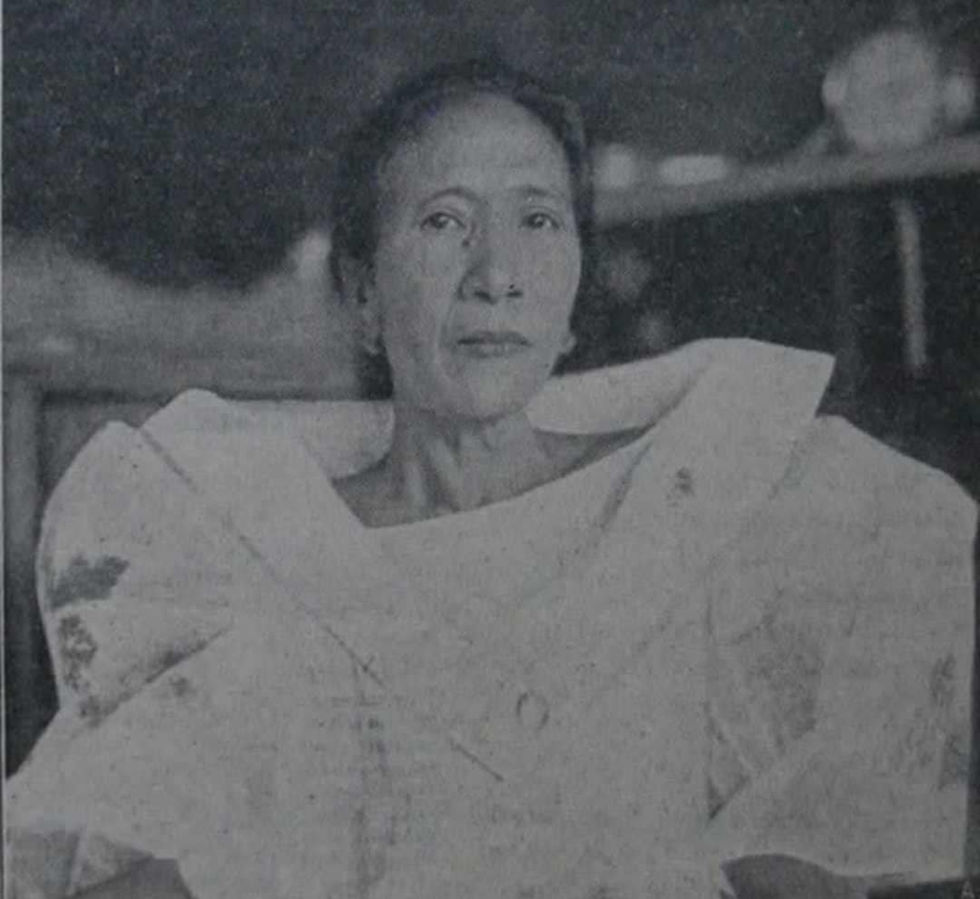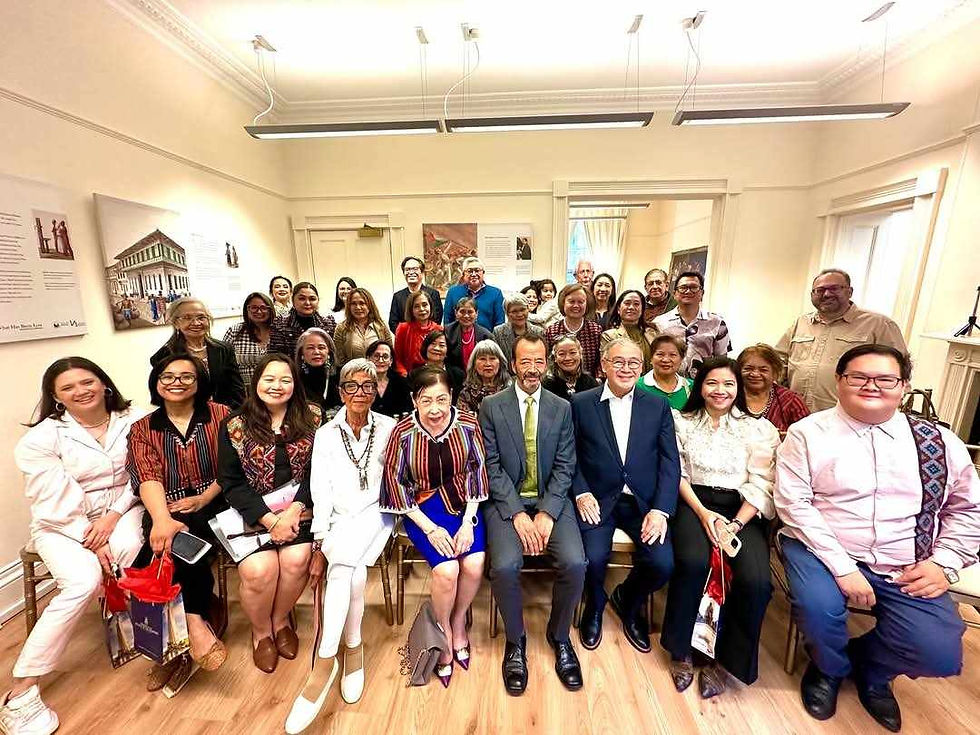Commemorating Gregoria de Jesus: heroine of the revolution at PE London
- Pinoy Portal Europe
- Jun 11
- 7 min read
By Gene Alcantara

The Philippine Embassy in London recently honoured one of the most revered
heroines of the Philippine revolution, whose legacy has shaped the nation's fight for
independence and whose influence reverberates through generations—the late
Gregoria de Jesus.
No less than the heroine's granddaughter, Jamie Tapales Oakes, graced the event
who paid a moving tribute to De Jesus by reading from a paper prepared for her by
writer Jim Richardson, an authority on Andres Bonifacio and the Katipunan. Oakes,
who has lived in London for many decades, was accompanied by her son Mark
Oakes who is as proud of his illustrious forebear.
“She named and blamed not only Aguinaldo, whom she called the foremost traitor to
the Katipunan, but also a dozen senior officers and advisers. She also named the two
men who had led the firing squad. Gregoria’s memories of the revolution were
obviously darkened by her husband’s tragic death and by her own maltreatment. But
to be brutally honest, she did not recall a time of adventure and glory, but hardship,
suffering, and bloodshed,” Oakes recounted to the gathering.

“The revolution, she told an interviewer in 1937, began with[out] any preparation in
terms of equipment and ammunition. They also had no money. Our heroes took to
the battlefield and fought an uneven fight, driven only by patriotism, the justice of the
cause, and the protection that God does not recruit from the [inaudible]. They had no
weapons other than bolos, bamboo spears and a few rifles. The Tagalog “Bahala
na” philosophy, I believe in surrendering to faith, was followed to the letter. There
was almost no medicine. We treated the soldiers with a mixture of banana tree bark,
chopped leaves from plants and salt,” she further added.
“Mealtimes sometimes passed without us having a bite. Perhaps moved by
compassion toward me, Andres would often say to me I don’t know how to repay you
for your sacrifice to our cause. Posterity will recognise you and that makes me
happy. It is good to know that Bonifacio was right as commemorations of Gregoria’s
150th birthday show. Posterity does indeed recognise the sacrifice for Inang Bayan
and will continue to do so,” she concluded.
A Woman of Courage and Resilience
Gregoria de Jesus was known as the "Lakambini" (Muse) of the Katipunan, and
others referred to her as the Mother of the Katipunan or even simply as “Donya
Oryang.”
She was one of the most formidable women in Philippine history. Born on 9 May
1875 in Caloocan, she became a pivotal figure during the Philippine Revolution
against Spanish colonial rule.
As the wife of Andrés Bonifacio, the Supremo and founder of the Katipunan, and
President of the Katagalugan Revolutionary Government, De Jesus was not only an
ardent supporter of the revolution, but also an active participant in it.
She had one son with Andres Bonifacio, who later died from illness.
She was entrusted with the task of safeguarding the revolutionary documents and
served as a critical link between the leaders of the movement.
Her commitment to the cause of freedom went beyond mere support.
Gregoria was known for her courage and selfless service, often taking on tasks that
were dangerous and demanding.
After Bonifacio’s execution by President Emilio Aguinaldo’s troops in the mountains
of Maragondon, Cavite, she also played an instrumental role in the protection of her
husband's legacy and the continuation of the Katipunan's mission.
She later married Julio Nakpil, a revolutionary general and bore him five children.
Tragically, her contributions have been overshadowed by the larger narratives of
male revolutionaries, but the significance of her sacrifices cannot be overstated.
She died in 1943 from a heart disease during the Japanese occupation of the
Philippines.
Role of Women in History
By commemorating Gregoria de Jesus, the Philippine Embassy in London did not
only pay tribute to the Lakambini (Muse) of the Katipunan, but also provided an opportunity for the community to reflect on the role of women in the shaping of Philippine history.
In a world where women's contributions are often overlooked, commemorating
Gregoria highlights the importance of recognizing the roles women have played in
political, social, and historical movements.
Honouring Gregoria de Jesus in the Philippines’ embassy abroad also underscored
the global influence of the Philippine struggle for independence and celebrates the
Filipino spirit that transcends borders.
In addressing the gathering, Philippine Ambassador to London Teodoro Locsin Jr.
paid tribute to the legacy of De Jesus, who he said was “once a young Filipina with,
we suppose, the dreams and fears of her youth, along with frailties ascribed to her
sex. Yet all those misconceptions were in consonance with a superhuman sense of
iron duty whatever the cost.”
“At just 18, Gregoria de Jesus took up the cause of Philippine freedom with a
boldness well beyond her years—or perhaps typical of youth. The young know not
fear. In the shadow of colonial rule, she kept the Katipunan’s secrets safe; guarded
its symbols; and fed kindling to its flame,” Locsin added.
He also reminded those who are present that as a Filipino diaspora community, it is
essential for the community to remember the historical figures who laid the
groundwork for the freedoms and privileges that we enjoy today.
The Philippine Embassy’s commemoration served not only as reminder for overseas
Filipinos of the contribution of early Filipinos but also to educate the international
community about the rich history of the Philippines, and also provides a point of pride
for Filipinos living abroad.

A Bridge Between Generations
At its core, the act of commemorating Gregoria de Jesus is a powerful reminder of
the importance of passing down historical knowledge to younger generations. In a
time when many young people may not be as familiar with the specifics of Philippine
history, such commemorations serve as educational platforms that rekindle interest
in the nation’s past. The embassy’s event offers a chance for both the younger
Filipino diaspora and those from other cultural backgrounds to learn about the
revolutionary heroism of women like Gregoria.
Ambassador Locsin also thanked Oakes and extended his gratitude to her and her
family, “for the legacy you carry to inspire this generation, the next, and succeeding
ones — be they English women or men by then.”
“For England is the country of the brave and the free which includes Filipinos who
brave a new place for a better life in equal freedom. For Filipinos freedom is a vital
force as it is for the English — reflected as in a mirror sharp and bright. But for your
forebears — Andres and Gregoria — we would not be free at home and here: free
to make and live our own choices in the country of liberty’s conception, birth and
fullest flower,” he added.
Additionally, for the Filipino community in the UK and other parts of the world, this
event allows the opportunity to forge deeper connections to their cultural heritage,
bridging the gap between their current lives abroad and the rich history of their
homeland. The more the community engages with their history, the more they are
empowered to contribute to the continuing fight for social justice and equality.
Strengthening Filipino Identity Abroad
For Filipinos in the UK, where there is a significant and growing diaspora,
commemorating Gregoria de Jesus reinforces the importance of maintaining a strong
cultural identity.

Amidst the challenges of adapting to a new culture and society, events like this serve
as an anchor, allowing Filipinos to celebrate their heritage and stand in solidarity with
one another. Through the Philippine Embassy’s initiative, the legacy of Gregoria de
Jesus becomes an enduring symbol of unity, resilience, and pride in being Filipino.
Two talented Filipinas, London-based singers, rendered songs for the event, including
Melisa Camba, theatre artist and singer, and Zophie Sunderland, from the Philippine
Embassy.
A panel of discussion by young British Filipino women achievers comprising Atty.
Danna Quinto, Chi-San Howard and Averil Pooten Watan was moderated by Consul
General Rhenita Rodriguez. The young women spoke of their careers in the UK,
empowerment, the heroines they look up to, and how they deal with life in this
country.

The discussion ended with a recitation of “The ten life lessons of Gregoria de Jesus”,
led by Mrs Locsin, and read by members of the audience.
Thanking the Embassy for hosting the event, Quinto wrote in a Facebook post that for her“(i)t was poignant to share stories of empowerment, and chronicles of the influential women figures in our lives” and that she was “(t)ruly flattered and
honoured to be in the same panel as Chi-San Howard and Averil Pooten Watan, and
to be able to meet Gregoria De Jesus's grandchildren.”
For those who came to the commemoration, the event may well be not just about
remembering one woman’s contributions to our national struggle but also a
celebration of all the unsung heroines who have quietly shaped the course of history.
The event may have also provided a chance to educate, to reflect, and to honour the
diverse contributions that have led to the Philippines' present-day identity. Also
through these acts of remembrance, it is ensured that the courage, resilience, and
determination of Gregoria de Jesus can continue to inspire future generations, both
in the Philippines and beyond.
In the commemoration of her life and legacy, the community was able to reaffirm its
commitment to upholding the values of freedom, justice, and equality that she, along
with many others, fought for.
###
[This article was written with assistance from ChatGPT for background research.]




Comments